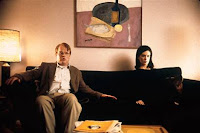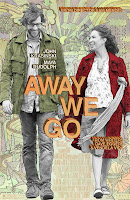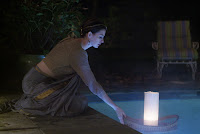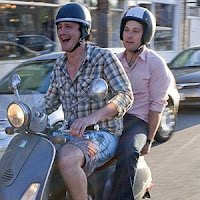 Think of the weirdest thing you’ve ever seen in your life. You might think it was weird, but after seeing “Happiness,” you won’t know what weird is anymore. I don’t say this in a negative way. “Happiness” exceeds any level of strangeness and thus propels itself into its very own, unique category.
Think of the weirdest thing you’ve ever seen in your life. You might think it was weird, but after seeing “Happiness,” you won’t know what weird is anymore. I don’t say this in a negative way. “Happiness” exceeds any level of strangeness and thus propels itself into its very own, unique category.
Yearly Archives: 2009
Kaitlin Olson Gets A Movie Role
 Kaitlin Olson, one of the stars of the TV series “It’s Always Sunny in Philadelphia” is one of the funniest women is showbiz right now up there with the ranks of Tina Fey and Amy Poehler. Her brilliant improv and fearlessness to do anything (like nearly vomit while performing stand up) make her a joy to watch. Now, she has been cast in a lead role in the upcoming film “Leap Year,” starring alongside Amy Adams.
Kaitlin Olson, one of the stars of the TV series “It’s Always Sunny in Philadelphia” is one of the funniest women is showbiz right now up there with the ranks of Tina Fey and Amy Poehler. Her brilliant improv and fearlessness to do anything (like nearly vomit while performing stand up) make her a joy to watch. Now, she has been cast in a lead role in the upcoming film “Leap Year,” starring alongside Amy Adams.
Summer Movie Trailers: I Love You, Beth Cooper & Public Enemies
Movie Review: Away We Go (Early Screening)
 At a glance of the poster for Away We Go, you might think it’s a “been there, done that” movie. The poster looks like a rip off of the opening credits of Juno and the poster of Once; all like a typical quirky indie flick. But, look closer (coincidentally, the tagline of director Sam Mendes’s previous film American Beauty) and you’ll find a small gem of a film that’s slow but ultimately refreshing in the current movie market place.
At a glance of the poster for Away We Go, you might think it’s a “been there, done that” movie. The poster looks like a rip off of the opening credits of Juno and the poster of Once; all like a typical quirky indie flick. But, look closer (coincidentally, the tagline of director Sam Mendes’s previous film American Beauty) and you’ll find a small gem of a film that’s slow but ultimately refreshing in the current movie market place.
Movie Review: Rachel Getting Married
 Is it impossible to forgive someone who has hurt you so badly? What if they are family, should you forgive them then? That is an essential questions that looms in the background and drives the plot of the heartbreaking but ultimately spiritually uplifting Rachel Getting Married.
Is it impossible to forgive someone who has hurt you so badly? What if they are family, should you forgive them then? That is an essential questions that looms in the background and drives the plot of the heartbreaking but ultimately spiritually uplifting Rachel Getting Married.
Breaking News: Bea Arthur Dies
Mike Judge Makes A New Movie: Extract
"Parks & Recreation": A Good Start?
 On Thursday April 9, the much anticipated “Parks & Recreation” began. It comes with much hype and in a time when good comedy is in dire need. So, how is the show thus far? Not amazing, but based on precedent, I will give it benefit of the doubt.
On Thursday April 9, the much anticipated “Parks & Recreation” began. It comes with much hype and in a time when good comedy is in dire need. So, how is the show thus far? Not amazing, but based on precedent, I will give it benefit of the doubt.
Temporary Vacancy
 From Friday, April 10 to Saturday, April 18 no new posts will be up. During this time, I will be in the Dominican Republic, building an aqueduct for a poor, waterless community. Hopefully, I will return with much video footage and maybe reviews of “Adventureland” (which I hope to see soon) and Parks & Recreation” (thanks NBC for deciding to premiere it on Passover. Not like many Jews like comedy anyway…). I don’t want to leave you on a bitter note so I will inform you that “Eastbound & Down” is officially coming back for a second season. Good. The more Kenny Powers, the better.
From Friday, April 10 to Saturday, April 18 no new posts will be up. During this time, I will be in the Dominican Republic, building an aqueduct for a poor, waterless community. Hopefully, I will return with much video footage and maybe reviews of “Adventureland” (which I hope to see soon) and Parks & Recreation” (thanks NBC for deciding to premiere it on Passover. Not like many Jews like comedy anyway…). I don’t want to leave you on a bitter note so I will inform you that “Eastbound & Down” is officially coming back for a second season. Good. The more Kenny Powers, the better.
Movie Review: I Love You, Man
Finally, a romantic comedy that guys and girls alike can enjoy. “I Love You Man” is a movie that takes a tired plot and tries to do something new with it. For the most part, it succeeds.
“I Love You Man” begins with Peter Klaven (Paul Rudd), a timid real estate agent, proposing to his long time girlfriend Zooey (Rashida Jones) in an empty lot amid downtown Los Angeles. She says yes. From there, the movie is about pre-wedding anxiety. Peter realizes his whole life that he has connected with women so well, but has never had any guy friends. So, he goes on a quest to find a best man before his wedding.
After a series of failed “man-dates,” Peter stumbles upon Sydney Fife (Jason Segel). Sydney is the kind of guy everyone wishes was their friend: he’s funny, philosophical, and does his own thing. Plus, he has a dog named after an Egyptian president. In no time, the two become nothing short of best friends.
“I Love You Man” is equipped with an ensemble that includes some of the best names in comedy. There are a few old legends (Jane Curtin, J.K. Simmons), a few new legends (Jon Favreau, Andy Samberg), and a few rising stars (Thomas Lennon, Sarah Burns). However, the real stars of the movie remain Rudd and Segel.
For years, Rudd was known as a great sidekick in movies like “Anchorman” and “The 40-Year-Old Virgin.” Last November, his performance in “Role Models” proved that the hilarious pessimistic cynicism he brings to supporting roles could work well in lead performances as well. In “I Love You Man,” he is given the chance to once again lead, and he shines. This time, he manages to bring more awkwardness than cynicism into the character of Peter. Rather than being someone who can’t communicate with women as in most romantic comedies, he is someone who can’t communicate with men. Rudd uses this for full, cringe worthy effect.
Also further improving his comedic ability is Segel. His performance here is less sad sack than his performance in last year’s “Forgetting Sarah Marshall” and more like his performance in “Freaks and Geeks,” as he is someone who seems to enjoy his ridiculously unrealistic life while being totally oblivious to reality.
Although “I Love You Man”’s plot is at times by-the-numbers, it doesn’t feel that way because of the twist added to it. The writers also deserve credit for incorporating the Lou Ferrigno cameo into the plot rather than just having it there for the sake of having a celebrity cameo. Also, it is great that writers John Hamburg and Larry Levin turned the final wedding scene into a somewhat serious moment rather than a cheap parody of “The Graduate.”
Unfortunately, this movie isn’t flawless. Favreu steals almost every scene he is in, but his marriage plotline could’ve been tied together better with the main storyline to provide insight into the struggling relationship between Pete and Zooey. Also, Samberg and Simmons are criminally underused.
While “I Love You Man” contains the usual cast and crew of a Judd Apatow production, his name is totally absent from the credits. However, he still manages to leave his mark on the final production. Like an Apatow film, “I Love You Man” shows great respect for its characters and doesn’t laugh in their faces when they fail. “I Love You Man” shows you don’t have to be mean to be funny.



